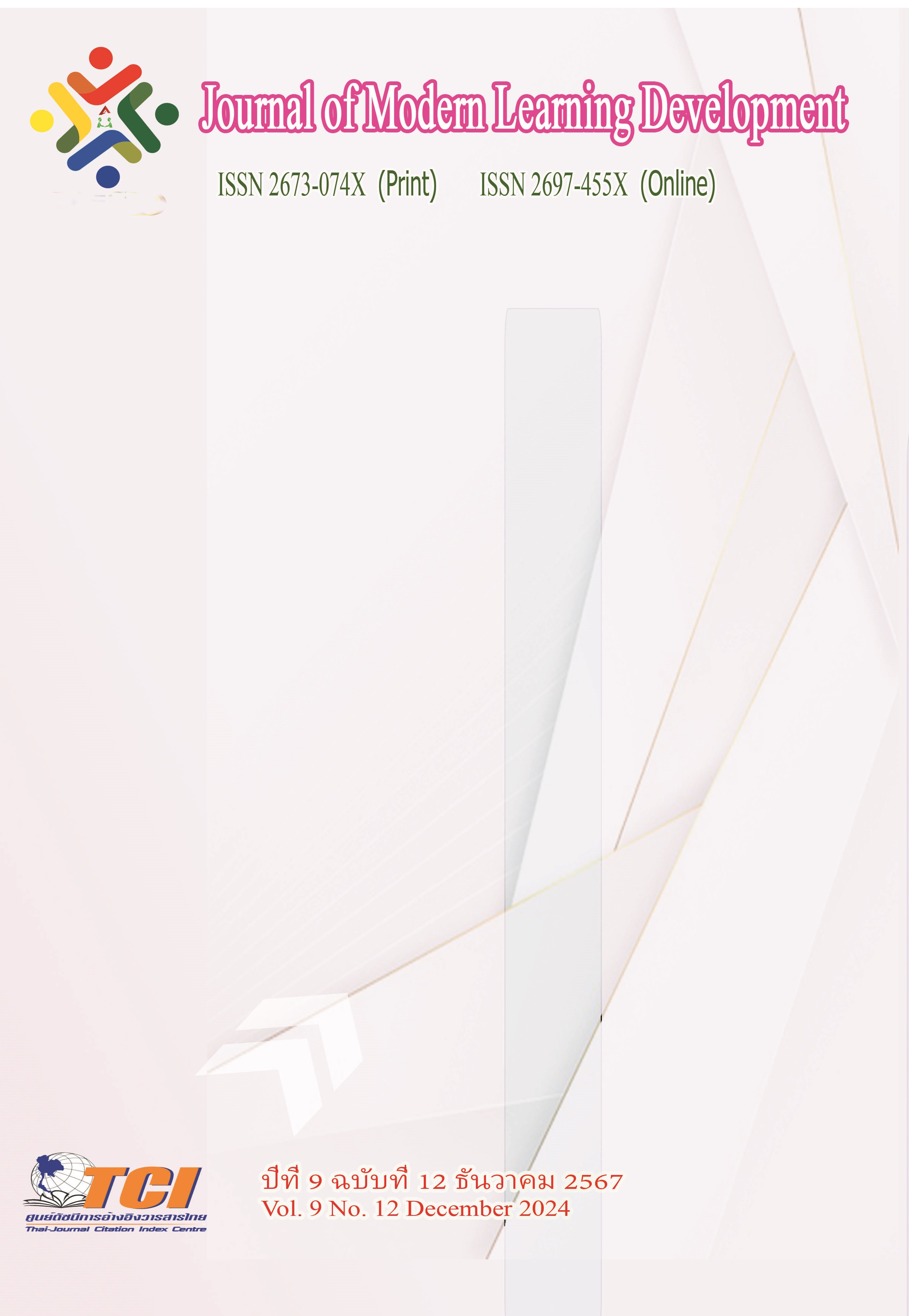Situational Leadership Affecting the effectiveness of Educational Institutions under the Secondary Educational Service Area Office Samut Sakhon Samut Songkhram
Main Article Content
Abstract
This research objectives to study 1) situational leadership level of educational institution administrators. 2) the effectiveness level of educational institutions. and 3) Situational leadership that affects the effectiveness of educational institutions under The Secondary Educational Service Area Office Samut Sakhon Samut Songkhram. The sample used in the research was 285 administrators and teachers under The Secondary Educational Service Area Office Samut Sakhon Samut Songkhram from a population of 1,086 people, using stratified random sampling by using location as a layer and randomizing proportionally. The research instrument was a questionnaire with a confidence value at .97 (a=0.97). Statistics used in data analysis included percentage, mean ( ), standard deviation (S.D.) and Stepwise multiple regression analysis
The results of the research found that 1) the overall level of school administrators’ situational leadership under The Secondary Educational Service Area Office Samut Sakhon Samut Songkhram was at a high level. 2) the overall level of effectiveness of educational institutions under The Secondary Educational Service Area Office Samut Sakhon Samut Songkhram was at a high level and 3) situational leadership were delegative leadership, directive leadership, participatory leadership and relationship-oriented behavior has an influence on the effectiveness of educational institutions under The Secondary Educational Service Area Office Samut Sakhon Samut Songkhram was statistically significant at the .05 level and can jointly predict effectiveness of educational institution under The Secondary Educational Service Area Office Samut Sakhon Samut Songkhram , got 57.00 percent.
Article Details
References
กระทรวงศึกษาธิการ. (2544). หลักสูตรการศึกษาขั้นพื้นฐาน พุทธศักราช 2544. กรุงเทพมหานคร: พัฒนาคุณภาพวิชาการ.
กวิสรา ชูทอง. (2560). ความสัมพันธ์ระหว่างภาวะผู้นำเชิงสถานการณ์ของผู้บริหารสถานศึกษากับประสิทธิผลของโรงเรียนสังกัดสำนักงานเขตพื้นที่การศึกษามัธยมศึกษา เขต 7 จังหวัดปราจีนบุรี. งานนิพนธ์การศึกษามหาบัณฑิต สาขาวิชาการบริหารการศึกษา มหาวิทยาลัยบูรพา.
ธาดา วิกัยวราภรณ์ อุไรรัตน์ แย้มชุติ และวิเชียร อินทรสมพันธ์. (2567). ภาวะผู้นำทางวิชาการของผู้บริหารสถานศึกษาที่ส่งผลต่อการเป็นองค์กร แห่งการเรียนรู้ของสถานศึกษาขั้นพื้นฐาน สังกัดกรุงเทพมหานคร กลุ่มกรุงธนเหนือ. Journal of Modern Learning Development. ปีที่ 8 ฉบับที่ 7 (2023): กรกฎาคม 2566, 98-114. . สืบค้นจาก ; https://so06.tci-thaijo.org/index.php/ jomld/article/view/260898.
ปาริชาต สมใจ. (2556). อิทธิพลของภาวะผู้นำตามสถานการณ์ของผู้บริหารสถานศึกษาต่อประสิทธิผลของสถานศึกษา สังกัดสำนักงานคณะกรรมการการศึกษาขั้นพื้นฐาน. วิทยานิพนธ์ กศ.ด. (การบริหารการศึกษา) นครปฐม : บัณฑิตวิทยาลัยมหาวิทยาลัยศิลปากร.
เพ็ญนภา ศรีแปลก. (2563). การศึกษาภาวะผู้นำของผู้บริหารสถานศึกษาขั้นพื้นฐาน สังกัดสำนักงานเขตพื้นที่การศึกษาประถมศึกษาสระแก้ว. วิทยานิพนธ์ปริญญาครุศาสตรมหาบัณฑิต สาขาวิชาการบริหารการศึกษา จันทบุรี : มหาวิทยาลัยราชภัฏรำไพพรรณี.
รัตนา เหลืองาม. (2562). ภาวะผู้นำของผู้บริหารสถานศึกษาในศตวรรษที่ 21 ที่ส่งผลต่อประสิทธิผลของสถานศึกษา สังกัดสำนักงานเขตพื้นที่การศึกษาประถมศึกษาจันทบุรี เขต 1. มหาวิทยาลัยราชภัฏรำไพพรรณี.
วาทิต บุญใบ, ไชยา ภาวะบุตร, ฤทัยทรัพย์ ดอกคำ. (2566). ภาวะผู้นำเชิงสถานการณ์ของผู้บริหารที่ส่งผลต่อประสิทธิผลการบริหารงานโรงเรียน สังกัดสำนักงานเขตพื้นที่การศึกษาประถมศึกษาสกลนคร เขต 1. วารสารการบริหารการศึกษาและภาวะผู้นำ ปีที่ 12 ฉบับที่ 45 : ตุลาคม - ธันวาคม 2566.
วิเชียร อินทรสมพันธ์ วิเชียร ทุวิลา และ ปราณีต ม่วงนวล. (2567). การเสริมสร้างคุณลักษณะครูไทยในศตวรรษที่ 21 ของนักศึกษาครู มหาวิทยาลัยราชภัฏบ้านสมเด็จเจ้าพระยาโดยใช้รูปแบบ การจัดการเรียนรู้แบบผสมผสาน. Journal of Roi Kaensarn Academi. 9(4),16-32. สืบค้นจาก ; https://so02.tci-thaijo.org/index.php/JRKSA/article/view/267243.
สถาบันทดสอบทางการศึกษาแห่งชาติ (องค์การมหาชน).(2564). ค่าสถิติพื้นฐานผลการทดสอบ O-NET ม.3 และ ม.6 ปีการศึกษา 2561-2564. สืบค้นจาก ; https://www.niets.or.th/th/content/view/ 11821.
สาวิตรี มาตขาว. (2560). ปัจจัยภาวะผู้นำทางวิชาการของผู้บริหารสถานศึกษาที่ส่งผลต่อประสิทธิผลการจัดการเรียนรู้ของครูผู้สอนในโรงเรียนสังกัดสำนักงานเขตพื้นที่การศึกษามัธยมศึกษา เขต 22. วิทยานิพนธ์ ค.ม.สกลนคร : มหาวิทยาลัยราชภัฏสกลนคร.
สำนักงานเขตพื้นที่การศึกษามัธยมศึกษาสมุทรสาคร สมุทรสงคราม. (2565). ผลการทดสอบทางการศึกษาระดับชาติขั้นพื้นฐาน (O-NET). สืบค้นจาก ; http://www.sesaskss.go.th/news-detail2249 43875.
Hersey, Paul, and Blanchard, Kenneth H. (1985). Management of Organizational behavior Utilizing Human Resources (Forth Edition). New Delhi : Prentice-Hall of India.
Krejcie, Robert V. and Dargle, Morgan W. (1970). Educational and Psychological Measurement.. Determining Sample Size For Research Activities. 30 (3) : 607- 608.
Moats, S.H. (1997). The Relationship between Organizational Culture and Organizational Effectiveness: Producing Pastoral Ministry and World-Mission Major Graduates in Four Denominational Colleges. Twin Cities, MN : Graduate School The University of Minnesota.
Mott, P.E. (1972). The Characteristic of Effective Organization. New York : Harper and Row.
Weinrich, Heinz and Koontz, Harold. (2005). Management: A Global Perspective. New Delhi : McGraw Hill.
Zhou ZhengFa, Wichian Intarasompun, and Nuttamon Punchatree. (2024). The Leadership Characteristics of Administrator of Chongqing Normal University. Journal of Modern Learning Development. 9, 6 (June. 2024), 96–109. Retrieved from: https://so06.tci-thaijo.org/index.php/jomld/article/view/268702.


